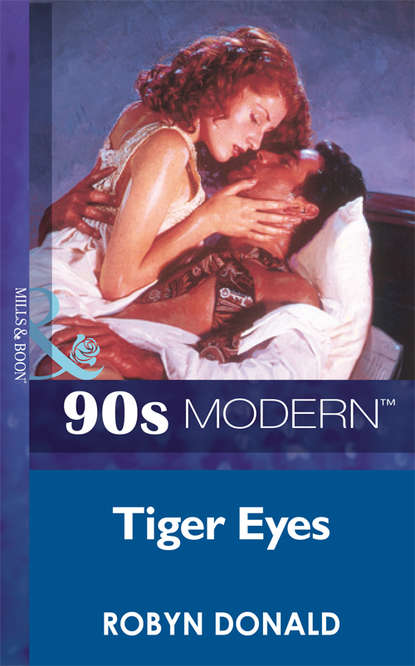По всем вопросам обращайтесь на: info@litportal.ru
(©) 2003-2024.
✖
Tiger Eyes
Автор
Год написания книги
2018
Настройки чтения
Размер шрифта
Высота строк
Поля
‘Then I’ll come in now.’
Although he was smiling, Tansy sensed an unyielding determination to have his own way. He was going to say his piece sooner or later: accepting that, she accepted that it might as well be said on neutral ground.
Not that the kiosk at the rose gardens had inhibited him at all! However, if they went out to dinner he couldn’t let slip the leash of his temper when she still refused to tell him where Rick was.
And although she didn’t dare admit it, he fascinated her. When she was with him she felt more alive than she ever had before.
She said offhandedly, ‘Oh, don’t bother, I’ll go out with you tonight. I can see I’m not going to get any peace until I do. But McDonald’s will be all right. I haven’t any formal clothes.’
His smile was twisted. ‘Wear what you’ve got on now, except for that beret. People won’t be looking at your clothes when they can see your hair.’
She shot him a last, fulminating glare, then got out of the car, slamming the door behind her. Unfortunately, it closed with the kind of solid heaviness that indicated excellent engineering and no damage done. Ignoring his laughter, Tansy stalked up the steps to her flat, her back held so stiffly her shoulders started to ache. Even safely inside she couldn’t relax until the car moved away.
She did have formal clothes, of a sort. When the music department at the university gave recitals of students’ work, each student conducted their own compositions. For those occasions she had assembled as near an approximation of conductors’ clothes as she could find. Several forays through charity shops had yielded an oldish but extremely well-cut dinner-jacket which she wore with a white shirt and tailored trousers.
At half-past six she gritted her teeth and began to dress.
The severe lines of the jacket and the ruffles down the front of the shirt camouflaged slightly too opulent breasts, and her one pair of court shoes added the extra inch and a half she needed to give her some degree of confidence. For a change she didn’t try to tame her hair. If Leo Dacre liked it so much, she thought, pushing a wilful tress back from her oddly flushed cheek, he could see it.
Except for a faint tinge of blusher along her high cheekbones and some gold eyeshadow, her skin and lips were as nature intended them. If she wore lipstick it made her mouth rather pouty and obvious. Her one luxury, the six-weekly dyeing of her pale lashes and brows, meant that her eyes were clearly defined. Fortunately they were large and dark enough to dominate a face that was too thin to be seductive.
Not, she assured herself as she turned away from the small mirror, that she wanted to be seductive. Not in the least. Brisk and businesslike—even formidable—was what she aimed for. Instead she looked short and slight and nondescript, except for her hair, which had enough character for ten people.
On the stroke of seven Leo’s knock sounded on the door, and if she had dressed to please him she would have been rewarded by his candid, unashamed survey, the slow kindle of flame in the green eyes, and the half-smile that tucked up the corners of the wide, mobile mouth.
‘Hello,’ he said. ‘You scrub up well, Tansy.’
The open laughter in his tone changed her initial reaction of fury and bleak resentment to a reluctant amusement. Stung because she was so easy to manipulate, she said, ‘So do you.’
In a leather jacket over superbly cut shirt and trousers, he looked relaxed and informal, yet he was marked by an inherent sophistication that made Tansy feel suddenly young and very gauche. She was streetwise, he was worldly; there was an immense gulf between the two. Why that should disturb her she didn’t know.
He opened the car door and held it with a teasing smile that invited her to comment. Tansy didn’t. Once in the car, however, he didn’t immediately start the engine.
Instead, scanning her profile, he said, ‘Why don’t we leave things as they are for the moment? I’d like to eat a meal without worrying in case you get up and storm away, or tip your plate over my head. I have to go back to Auckland the day after tomorrow; shall we go out to dinner tonight and tomorrow night, and after that I’ll talk to you about Ricky?’
Say no, her common sense commanded her. Say no right now and go back inside and take off your pathetic attempts to look sleek and fashionable, and never see him again.
But something more fundamental than common sense prevented her from such drastic action.
Aloud, slowly, because she knew she was being stupid, putting herself in danger, she said, ‘Yes, all right,’ and comforted her sensible self by remembering that he was going away soon.
Besides, she reminded herself with a certain tough practicality that came from years of watching every penny, the free meals were saving her money.
To make things absolutely clear, she said brusquely, ‘I’m only going out with you because you’re paying for my dinner.’
His smile was cold and fleeting. ‘I know,’ he said.
That smile and the dispassionate tone of his voice sent a shiver tiptoeing delicately along her nerves.
He took her to a restaurant Tansy had heard about but never expected to visit. It was very expensive—part club, part café, and entirely fashionable—and she realised immediately that the unwritten dress code stipulated only that clothes be worn with panache. After several minutes she relaxed. She certainly wasn’t the most outrageously dressed woman there by any means. In fact, she was one of the more conventionally garbed.
What she hadn’t expected was the attention. Leo was clearly as well known here as in his native Auckland. After the third expensively dressed couple had stopped at their table, been introduced, and bubbled with enthusiasm and very cultured vowels at seeing him, she looked at him, lean and assured, sexy in a way that undermined her carefully constructed defences, and asked on a light note of provocation, ‘Do you know everyone in New Zealand?’
‘A lot,’ he returned, his tone as casual as hers. ‘I think I’m probably related to most of them. Both my parents came from very large extended families, so I’ve got cousins all over the place. As well, my father was active in public life. And I come to Wellington quite often.’
Which made it surprising that Rick had come here. Unless, of course, he had wanted to be found. More than once he’d admitted that he was very dependent on his brother, so perhaps unconsciously he’d been waiting for Leo to rescue him.
Instead, he’d decided to rescue himself. It had taken courage, and he should have his chance to ‘find himself’, as Leo so sneeringly put it.
‘That’s a very stubborn look,’ Leo said softly.
Tansy’s long lashes quivered. ‘I’m a very stubborn person,’ she returned.
‘But not tonight. Tonight you don’t have to be stubborn. Do you want to dance?’
A sudden deliquescence at the base of her spine warned her that dancing with him wouldn’t be a good idea. ‘Not just now,’ she said. ‘Tell me what it’s like being a barrister.’
He looked surprised. ‘Stimulating,’ he said after a moment’s consideration. ‘Exhausting. It ranges from intense satisfaction to times when the world seems a wholly negative place. I wouldn’t be anything else.’
Apart from her foster-father, whose only aim in working seemed to be the desire to make enough money so that his wife could buy the things she wanted, Tansy had little experience with men. Neither Les O’Brien nor the men she studied with at university were anything like Leo Dacre, who had a compelling magnetism that was unique.
From behind the menu she said, ‘It sounds unsettling.’
‘Don’t you find life like that? Days when you think you can conquer the world, and other days when life puts you neatly back into your insignificant place?’
She was startled. It was difficult to imagine such a self-assured man feeling insignificant. ‘Yes, of course, but I didn’t think you would.’
‘Why not?’ Straight dark brows rose. He smiled at her swift colour and asked, ‘Stereotyping me, Tansy?’
‘I suppose I was,’ she agreed reluctantly.
‘I’m a man, like all other men. If you cut me, I bleed.’
A harsh undertone in his voice made her wince but she returned robustly, ‘You don’t have to convince me.’
‘No?’ He paused, his expression unreadable, then said abruptly, ‘Tell me what you’re doing studying composition in the music department at the university here.’
She shrugged. ‘I think I was born making music. When I was a toddler I sang instead of talking. My foster-parents aren’t at all musical, so it was lucky for me that Pam, my foster-mother, used to clean house for an old lady who lived not far from us. She’d been a music teacher, and I think she missed it.’
She had shown Tansy how to play, and, when she realised how fascinated the child was, had begged to be able to teach her. Pam O’Brien had refused, citing lack of money, so Miss Harding had contacted the social welfare department. Some understanding person there had thought it a wonderful idea and organised the payments.
That had been the beginning of Tansy’s double life. At home she had been the odd one out. At Miss Harding’s she learned to round her vowels, discovered a whole new set of rules to govern her behaviour, listened with tears running down her face to the great composers, been made over for the best of motives into her mentor’s image. But Tansy’s happiness there, her sense of fulfilment, her eagerness to learn and desire to copy her mentor, set up tensions that eventually led to her flight from home.
‘When I had piano lessons,’ she went on, ‘I spent most of my time trying to work out the theory rather than actually play the piano. I knew right from the start that I wanted to write music.’
Although forbidden to, she’d written at night, waiting until her older sister was asleep to work by the light of a torch. Of course, the inevitable happened; she was discovered. Angry with her for her disobedience, Pam had burned six months’ work, so from then on Tansy had become even more secretive, losing herself for hours at a time in the special world she shared with Miss Harding.
Scrawny, intense, prone to temper tantrums and obstinacy, unable to compromise, she had been difficult. Like all creative people, she thought mockingly, she had suffered for her art. And so had her foster-parents. They hadn’t been actively unkind; they had simply not understood her. Part of Pam O’Brien’s resentment was due to the fact that she couldn’t afford such lessons for her own children. It had been with a certain suppressed satisfaction that she had told Tansy one day in her fourteenth year that the old lady was dead.











